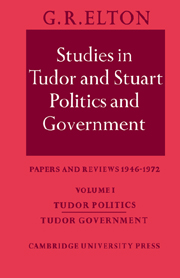Book contents
- Frontmatter
- Contents
- Preface
- Acknowledgments
- Abbreviations
- 1 The Terminal Date of Caesar's Gallic Proconsulate
- I TUDOR POLITICS
- II TUDOR GOVERNMENT
- 13 The Problems and Significance of Administrative History in the Tudor Period
- 14 The Rule of Law in Sixteenth-Century England
- 15 State Planning in Early-Tudor England
- 16 Henry VII's Council
- 17 Government by Edict?
- 18 Why the History of the Early Tudor Council Remains Unwritten
- 19 Henry VIII's Act of Proclamations
- 20 The Elizabethan Exchequer: War in the Receipt
- General Index
- Index of Authors Cited
19 - Henry VIII's Act of Proclamations
Published online by Cambridge University Press: 03 February 2010
- Frontmatter
- Contents
- Preface
- Acknowledgments
- Abbreviations
- 1 The Terminal Date of Caesar's Gallic Proconsulate
- I TUDOR POLITICS
- II TUDOR GOVERNMENT
- 13 The Problems and Significance of Administrative History in the Tudor Period
- 14 The Rule of Law in Sixteenth-Century England
- 15 State Planning in Early-Tudor England
- 16 Henry VII's Council
- 17 Government by Edict?
- 18 Why the History of the Early Tudor Council Remains Unwritten
- 19 Henry VIII's Act of Proclamations
- 20 The Elizabethan Exchequer: War in the Receipt
- General Index
- Index of Authors Cited
Summary
It may well be thought that enough has been written about the famous act of 1539 which dealt with royal proclamations and was at one time regarded as the highwater mark of Tudor despotism. Over forty years ago Mr E. R. Adair published an article which disposed of the more extravagant misstatements concerning it and suggested a truer interpretation. Since then we have had authoritative comment from Pollard, Pickthorn and Holds worth all of whom at least agree that the angry denunciations listed by Adair were wrong and that the act did nothing towards creating a royal despotism in England. The present writer has before this had occasion to refer briefly to some aspects of the statute, expressing views with which he is no longer altogether satisfied. However, two things may excuse yet another attack on what must always be an important historical problem. Adair's article did not find general acceptance; above all, Tanner, whose words on this are probably read more widely than anyone else's, was rather tart about his attempt to play down the act's importance and sat on the fence to such good purpose that an untenable older view has been allowed to survive behind a cloak of mistaken caution. Holdsworth had his doubts about Adair's suggestion that the act was not at all concerned with the validity of proclamations, and Mr Stone has rightly charged Adair with failing to explain the opposition to the bill.
- Type
- Chapter
- Information
- Studies in Tudor and Stuart Politics and GovernmentPapers and Reviews 1946–1972, pp. 339 - 354Publisher: Cambridge University PressPrint publication year: 1974



